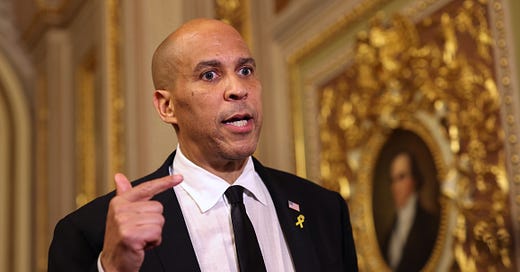
In a recent Wall Street Journal essay, I described the unwelcome novelty of having numerous publishers reject my latest novel after publishing twenty-two prior novels, sixteen of them New York Times bestsellers. But most dispiriting was confronting the new regime in publishing: that as a white author, I should not have presumed to write fiction which featured black characters grappling with issues of racial justice.
Happily, I found an independent publisher willing to defy the strictures of literary apartheid. They are publishing Trial on June 13, and we have started releasing installments on Substack (see richardnorthpatterson.substack.com), so that readers can judge for themselves. But the larger story is what I learned from writing fiction about racially charged topics, and what that experience says about the toxicity of creative segregation. And the larger question raised by that experience is whether, and how, writers of fiction can continue to engage compelling social and political issues—as they’ve done for centuries.
Many great authors—think Zola and Dickens—wrote novels that presented realistic portraits of society, explicitly intended to awaken the conscience of readers to the privation, and, quite often, the perspective, of working-class people. Nor did such Americans as Mark Twain, Upton Sinclair, Stephen Crane, and Tom Wolfe shrink from novels that examined race and class.
What distinguished these novels of “social realism” from other works of fiction is that they were deeply researched—and frequently based on firsthand investigation of experiences not shared by their authors, white males of their time who nonetheless thought fiction could, and should, address important subjects beyond the prism of their own personal identity. Without comparing myself to these bygone literary eminences, I’ve generally followed this realist tradition—often by drawing on my background as a trial lawyer to portray high-stakes legal controversies rooted in important social issues.
The courtroom, after all, is the crucible where conflicting interests clash and competing claims of justice are adjudicated. One cannot write about the inequities of the American legal system without engaging the perspectives of people different from oneself. Therefore, of necessity, I’ve tried to infuse the practice of a journalist into my sensibility as a novelist.
I’m also a political commentator and, as such, drawn to our most pressing social issues. While composing over 300 columns between 2015 and 2021, I perceived a compelling subject for fiction—using the power of a good story to engage a wider audience with America’s ongoing tribulations of race. Accordingly, I conceived a narrative culminating in the televised trial of an 18-year-old black voting rights worker for the fatal shooting of a white sheriff’s deputy in rural Georgia. I hoped to immerse readers in dramatic events rooted in voter suppression, racism in law enforcement, the rise of white nationalism, and the mass exploitation of racial anxiety by politicians and the media.
Obviously, I could not write this novel without the assiduous research—including extensive interviews—necessary to ground fiction in reality. So I traveled to Sumter County in Southwest Georgia, a jurisdiction with a harsh racial past that still permeates its present. My interviewees included numerous blacks immersed in the struggle for voting rights: judges, law enforcement officers, ministers, civil rights and defense attorneys, politicians, community leaders, voting rights activists, elected officials, and ordinary citizens. Fortunately for me and my readers, these black Georgians were uniformly generous in sharing their own challenges, while immersing me in their social and physical environment. This process not only shaped the narrative of Trial, but immeasurably enriched my fictional characters.
I heard some striking pieces of history from blacks who were there: the civil rights lawyer who occupied a jail cell next to Martin Luther King on a night where MLK feared for his life. The defense lawyer whose armed neighbors slept in his living room at night to protect him and his family. The woman who, in 1963 at the age of 11, was jailed with other adolescent girls under traumatic conditions for attempting to integrate a movie theater. But my approach to writing Trial also validated Faulkner’s famous maxim: “The past is never dead. It’s not even past.”
In Sumter County, as in many Northern locales, the rigid social and residential segregation is glaring. Equally telling, though, is the segregation of the dead. A young community leader took me on a tour of two cemeteries in the county seat—each defined by the race of the occupants. The white cemetery was neatly tended and marked by opulent monuments, some fulsomely commemorating the Confederacy. By comparison the black cemetery was parched and relatively barren. When I asked him if either cemetery offered a single example of diversity in death, he give me a look of disbelief, and said that he had never heard of such a thing.
But the black cemetery offered the most piercing image of contemporary conditions for the living—a section with rows of unusually small monuments, some fresh, often graced by toys or dolls. It was called “Babyland,” my guide explained, and reserved for black boys and girls who had died in childhood. The presents were their families’ last gift, mute testament to infant mortality.
Nor was the past dead for the black woman who ran the state’s seminal voting rights group, the New Georgia Project, through the fiercely contested election of 2022. In the course of discussing the intricacies of voter suppression, she detailed the personal cost of her work: a tsunami of death threats which required constant vigilance and security, made all the more necessary when a right-wing website posted her photograph and the location of her home.
This is both appalling and unsurprising: American history tells us how poisonous—indeed, deadly—the drive for political power can be when motivated by racism. And the legislative measures to curtail voting rights in Georgia are, quite obviously, intended to limit black participation at the polls.
For the proponents, the stakes are near-existential—preserving the dominance of conservative whites. Georgia is closely divided between Republicans and Democrats, whites and minorities: keeping 10,000 black Georgians from voting can change the outcome of a statewide election for president, governor, or senator, potentially deciding who holds power not only in Georgia, but in the country.
The details of voter suppression in Georgia became an integral part of my story. My principal female character, the black voting rights leader Allie Hill, helps distill for the reader what I learned from interviewing Georgians on the ground—puncturing myths in a way my predominantly white readership might otherwise never hear. One key example: Republican- sponsored legislation allegedly combating voter fraud feature a grab bag of measures quite obviously targeting blacks.
Take voting by mail. Before 2021, the GOP used it as a tool for maximizing the vote from white seniors. As Allie explains at an emotionally charged rally: “Right up to 2020, Republicans loved voting by mail. They wanted all the old white folks who support them to vote without ever leaving their rocking chairs.”
Accordingly, as Allie recounts, counties in Georgia were free to send absentee ballots to all registered voters, and the secretary of state sent every registered voter an absentee ballot application. As Allie says: “Any conservative Caucasian this side of the grave didn’t even have to lick a postage stamp” in order to vote.
By contrast many thousands of blacks were unable to vote due to their personal and economic circumstances. These difficulties were often exacerbated by strategic closures of polling places in black areas, which make voting more difficult and time consuming. In her speech, Allie references “the lines in a county where they’ve shut down all but one polling place. . . . It’s like purgatory for Black people. If you have kids to look after or can’t take hours off from work, or you’re too sick or old to wait in line forever, you effectively can’t vote.”
But in the pivotal election of 2020, more black Georgians voted. By the narrowest of margins, Georgia helped make Joe Biden president and sent two Democrats to the Senate. The critical difference was that groups like the New Georgia Project encouraged black voter participation through mail-in balloting.
So in 2021, as the narrative of Trial spells out, the GOP passed legislation to drastically limit voting by mail. In my novel, Allie identifies the obvious motivation: voting rights groups “started encouraging the wrong kind of people to mail in their ballots.” She also details for my readers other measures crafted to keep blacks from voting. One is almost comically inhumane—it criminalizes giving out water to people standing in line, sometimes for hours, just to cast a ballot. As Allie sardonically observes: “They’d rather have Grandma drop dead from dehydration than vote.”
Through Allie, these tools of voter suppression are woven into my narrative. Beset by death threats, Allie is shot at in her own home. The black voting rights worker facing a potential death sentence for capital murder is Allie’s teenage son Malcolm. And the key to Malcolm’s defense is his black lawyer’s desperate efforts to prove that the late-night traffic stop by the dead white deputy was an extralegal act of intimidation—or worse—directed not only at Malcolm but at his mother.
My hope is that the story of Allie Hill and her son can inspire empathy and imagination across the lines of identity, moving readers to consider issues of race in a new and different light. But for this I would not have written Trial at all.
Since when, one must ask, is it forbidden in fiction for a white author to address social conditions that affect minorities in particular, but should concern us all? Must white novelists be reduced to narratives of solipsistic self-contemplation? Do we really need yet another novel detailing the angst of young white professionals who live in Brooklyn or Manhattan?
The willingness of black Georgians to share their harsh realities enabled me to tell a different—and, I believe—more important story. Their own stories suffuse the novel, and it could not exist without them. But it also exists because I met them where they lived.
Viewed in this light, the self-righteousness inherent in enforcing the preemptive censorship of books based on authorial identity is redolent with irony. Given the demographics of the major publishing houses in New York, it’s near-certain that the great majority of publishers who objected to my identity are white, and have little or no experience of the challenges facing the black Georgians who spoke to me from their own experience. For these publishers to imagine themselves the literary benefactors of black America bespeaks a self-flattering and lamentably unexamined condescension. Do they never look in the mirror, and see reflected the book banners and racial history suppressors of the right?
Enough.
It is past time to escape this suffocating cul-de-sac. We don’t need literary apartheid—a black literature for black readers written exclusively by black authors, and a white literature crafted by white authors premised on the insistence that it’s impossible, even arrogant, to deploy authorial imagination beyond one’s racial identity.
Instead we need an American literature that unshackles the creative gifts of diverse fiction writers who make a conscientious commitment to cast off the blinkers of tribe. Only then can we have a body of fiction which speaks to the best in all of us.












